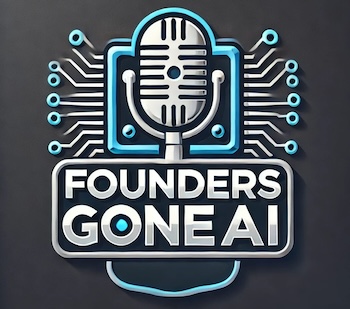Episode Summary:
In this episode of Founders Gone AI, the hosts dive into the journey of developing and marketing AI-driven products as bootstrap founders. The conversation kicks off with a discussion about Steve’s experiences in building his latest app, PodMagic, which is nearing its launch phase. Steve shares his challenges in finding specialized tech talent, which led him to simplify his tech stack by using more common technologies to make his app easier to manage. As he prepares for the app’s release, Steve emphasizes the importance of getting user feedback and plans to initially onboard a select group of users to refine the product. He also discusses the strategy of providing ancillary content to add value for potential customers, such as creating guides on writing effective show notes, which could highlight the benefits of using PodMagic.
The hosts delve into the age-old debate of balancing product development with marketing efforts. Steve reflects on advice from seasoned entrepreneurs, realizing the need to pivot from product development to focus more on marketing to attract users. The conversation includes insights from Rob Walling’s experiences, particularly the challenges and strategies of marketing a high-value app without falling into the trap of undervaluing it through platforms like AppSumo. They explore the potential risks and rewards of such platforms, debating whether the exposure and initial sales are worth the long-term implications of discounted lifetime deals. Steve is determined to maintain a higher price point, affirming his app’s value compared to traditional podcast producers.
The podcast episode further explores the evolving landscape of AI in app development, highlighting the shift from traditional app-building to creating AI agents that replicate human roles, thus offering cost efficiencies. This shift underscores the urgency for Steve to market his app while it still stands out against human producers, before facing increased competition from other AI-driven solutions. The hosts also discuss the nuanced challenges of synthetic data, emphasizing the importance of functional, verifiable data, especially in the realms of programming and AI development. They express cautious optimism about the potential of synthetic data to supplement the vast human knowledge already harnessed by AI systems, while acknowledging the complexities involved in ensuring its quality and applicability. Overall, the episode offers a rich discussion on the entrepreneurial journey of integrating AI into innovative product solutions.
Episode Timeline:
00:00:01 – Introduction to Founders Gone AI
The hosts introduce the podcast, discussing their journeys as bootstrap founders in the AI-driven product space.
00:02:37 – App Development Update
Steve provides an update on his app development process, discussing the challenges of finding the right technologies and the progress towards launching his app, PodMagic.
00:07:08 – Marketing Strategies
Discussion on potential marketing strategies, including joining professional networking groups, sponsoring podcasts, and creating valuable content for users.
00:19:00 – Product vs. Marketing Balance
The hosts debate the balance between focusing on product development and marketing, referencing Rob Walling’s experiences and strategies.
00:32:20 – New Role and AI Demos
Steve hints at a new role involving AI demos and discusses the importance of showing people what they can achieve with AI tools.
00:35:15 – AI in Development
Discussion on using AI tools like Cursor for development, and the benefits of using heavily typed languages to improve code quality and AI integration.
00:42:23 – Synthetic Data Debate
The hosts discuss the potential and limitations of synthetic data in AI development, questioning its value compared to human-generated data.
00:45:10 – Personal Updates and Future Plans
The hosts share personal updates, including a home renovation project and plans for future product marketing and development.
Key Discussion Points:
App Development and Launch: The episode discusses the process of developing and launching an app called Pod Magic, focusing on its features, the challenges faced during development, and the strategy for initial user onboarding and feedback collection.
Marketing Strategies for SaaS Products: Various marketing strategies for promoting software products are explored, including the pros and cons of using platforms like AppSumo, the importance of targeting the right audience, and the role of pricing in consumer perception.
AI in Software Development: The hosts discuss the integration of AI in software development, including the use of AI tools to build and improve applications, and the potential future shift from traditional app development to creating AI agents.
Synthetic Data and AI Training: The episode touches on the concept of synthetic data and its role in training AI models. The hosts express skepticism about the quality and reliability of synthetic data compared to real-world data.
Personal and Professional Balance: A personal segment where the hosts share their experiences balancing professional responsibilities with personal projects, such as home renovations, and how these affect their work-life dynamic.
Resources and Links:
-
AppSumo: A platform offering lifetime deals on software and digital products.
URL: https://appsumo.com -
Kajabi: An all-in-one platform for creating and selling online courses, memberships, and digital products.
URL: https://kajabi.com -
Laravel Jetstream: A beautifully designed application scaffolding for Laravel, providing login, registration, email verification, and other features.
URL: https://jetstream.laravel.com -
Cursor: A tool for building and managing software projects, often used with AI to enhance coding efficiency.
URL: https://cursor.com -
Docker: Documentation for Docker, a platform for developing, shipping, and running applications in containers.
URL: https://docs.docker.com

